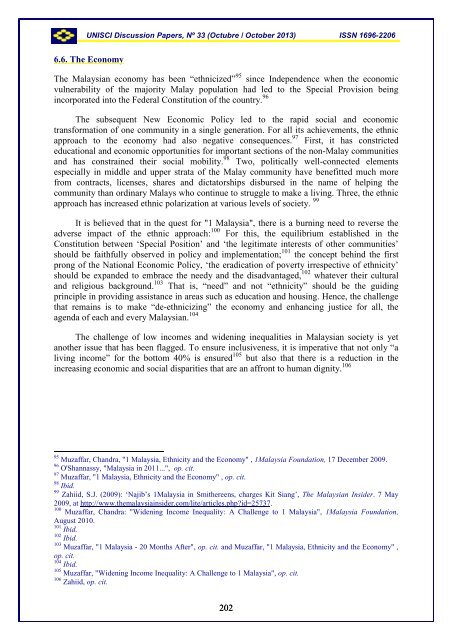UNISCI - Universidad Complutense de Madrid
UNISCI - Universidad Complutense de Madrid
UNISCI - Universidad Complutense de Madrid
Create successful ePaper yourself
Turn your PDF publications into a flip-book with our unique Google optimized e-Paper software.
<strong>UNISCI</strong> Discussion Papers, Nº 33 (Octubre / October 2013) ISSN 1696-22066.6. The EconomyThe Malaysian economy has been “ethnicized” 95 since In<strong>de</strong>pen<strong>de</strong>nce when the economicvulnerability of the majority Malay population had led to the Special Provision beingincorporated into the Fe<strong>de</strong>ral Constitution of the country. 96The subsequent New Economic Policy led to the rapid social and economictransformation of one community in a single generation. For all its achievements, the ethnicapproach to the economy had also negative consequences. 97 First, it has constricte<strong>de</strong>ducational and economic opportunities for important sections of the non-Malay communitiesand has constrained their social mobility. 98 Two, politically well-connected elementsespecially in middle and upper strata of the Malay community have benefitted much morefrom contracts, licenses, shares and dictatorships disbursed in the name of helping thecommunity than ordinary Malays who continue to struggle to make a living. Three, the ethnicapproach has increased ethnic polarization at various levels of society. 99It is believed that in the quest for "1 Malaysia", there is a burning need to reverse theadverse impact of the ethnic approach: 100 For this, the equilibrium established in theConstitution between ‘Special Position’ and ‘the legitimate interests of other communities’should be faithfully observed in policy and implementation; 101 the concept behind the firstprong of the National Economic Policy, ‘the eradication of poverty irrespective of ethnicity’should be expan<strong>de</strong>d to embrace the needy and the disadvantaged, 102 whatever their culturaland religious background. 103 That is, “need” and not “ethnicity” should be the guidingprinciple in providing assistance in areas such as education and housing. Hence, the challengethat remains is to make “<strong>de</strong>-ethnicizing” the economy and enhancing justice for all, theagenda of each and every Malaysian. 104The challenge of low incomes and wi<strong>de</strong>ning inequalities in Malaysian society is yetanother issue that has been flagged. To ensure inclusiveness, it is imperative that not only “aliving income” for the bottom 40% is ensured 105 but also that there is a reduction in theincreasing economic and social disparities that are an affront to human dignity. 10695 Muzaffar, Chandra, "1 Malaysia, Ethnicity and the Economy" , 1Malaysia Foundation, 17 December 2009.96 O'Shannassy, "Malaysia in 2011...", op. cit.97 Muzaffar, "1 Malaysia, Ethnicity and the Economy" , op. cit.98 Ibid.99 Zahiid, S.J. (2009): ‘Najib’s 1Malaysia in Smithereens, charges Kit Siang’, The Malaysian Insi<strong>de</strong>r. 7 May2009, at http://www.themalaysiainsi<strong>de</strong>r.com/lite/articles.php?id=25737.100 Muzaffar, Chandra: "Wi<strong>de</strong>ning Income Inequality: A Challenge to 1 Malaysia", 1Malaysia Foundation,August 2010.101 Ibid.102 Ibid.103 Muzaffar, "1 Malaysia - 20 Months After", op. cit. and Muzaffar, "1 Malaysia, Ethnicity and the Economy" ,op. cit.104 Ibid.105 Muzaffar, "Wi<strong>de</strong>ning Income Inequality: A Challenge to 1 Malaysia", op. cit.106 Zahiid, op. cit.202
















